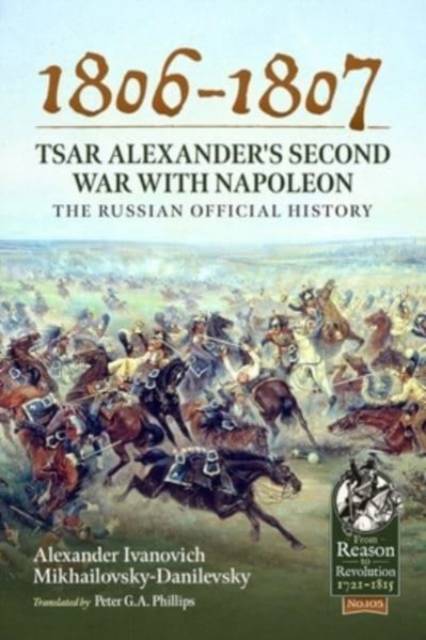
Door een staking bij bpost kan je online bestelling op dit moment iets langer onderweg zijn dan voorzien. Dringend iets nodig? Onze winkels ontvangen jou met open armen!
- Afhalen na 1 uur in een winkel met voorraad
- Gratis thuislevering in België vanaf € 30
- Ruim aanbod met 7 miljoen producten
Door een staking bij bpost kan je online bestelling op dit moment iets langer onderweg zijn dan voorzien. Dringend iets nodig? Onze winkels ontvangen jou met open armen!
- Afhalen na 1 uur in een winkel met voorraad
- Gratis thuislevering in België vanaf € 30
- Ruim aanbod met 7 miljoen producten
Zoeken
1806-1807 - Tsar Alexander's Second War with Napoleon
The Russian Official History
Alexander Ivanovich Mikhailovsky-Danilevsky
€ 41,95
+ 83 punten
Omschrijving
The Russian official history of the second war between Emperor Alexander and Napoleon, in 1806 and 1807, using original military and diplomatic documents and the testimonies of witnesses and participants from the war.
First published in 1846, the history considers the reasons for the war undertaken by Emperor Alexander in alliance with Prussia, the disaster that befell Prussia at Jena and Auerstedt, and Alexander's mobilization when, after the destruction of the Prussians, Napoleon moved to the borders of Russia.
Following Napoleon's crossing to the right bank of the Vistula, the narrative describes the subsequent Russian military operations against Napoleon in both the winter and spring campaigns. The winter campaign culminated with the Battle of Eylau, with consideration to the exhaustion of the fighting armies, frosts, impassable roads, and political factors that stopped the bloodshed in the main theater of war until May.
The narrative then considers the inactivity of the armies, and exhaustion of all possible resources in anticipation of the spring campaign, before concluding with Napoleon's repulse at Heilsberg, the Russian defeat at Freidland, retreat to the right bank of the Neman and peace at Tilsit.
First published in 1846, the history considers the reasons for the war undertaken by Emperor Alexander in alliance with Prussia, the disaster that befell Prussia at Jena and Auerstedt, and Alexander's mobilization when, after the destruction of the Prussians, Napoleon moved to the borders of Russia.
Following Napoleon's crossing to the right bank of the Vistula, the narrative describes the subsequent Russian military operations against Napoleon in both the winter and spring campaigns. The winter campaign culminated with the Battle of Eylau, with consideration to the exhaustion of the fighting armies, frosts, impassable roads, and political factors that stopped the bloodshed in the main theater of war until May.
The narrative then considers the inactivity of the armies, and exhaustion of all possible resources in anticipation of the spring campaign, before concluding with Napoleon's repulse at Heilsberg, the Russian defeat at Freidland, retreat to the right bank of the Neman and peace at Tilsit.
Specificaties
Betrokkenen
- Auteur(s):
- Uitgeverij:
Inhoud
- Aantal bladzijden:
- 232
- Taal:
- Engels
- Reeks:
Eigenschappen
- Productcode (EAN):
- 9781804511930
- Verschijningsdatum:
- 24/03/2023
- Uitvoering:
- Paperback
- Formaat:
- Trade paperback (VS)
- Afmetingen:
- 157 mm x 226 mm
- Gewicht:
- 317 g

Alleen bij Standaard Boekhandel
+ 83 punten op je klantenkaart van Standaard Boekhandel
Beoordelingen
We publiceren alleen reviews die voldoen aan de voorwaarden voor reviews. Bekijk onze voorwaarden voor reviews.











